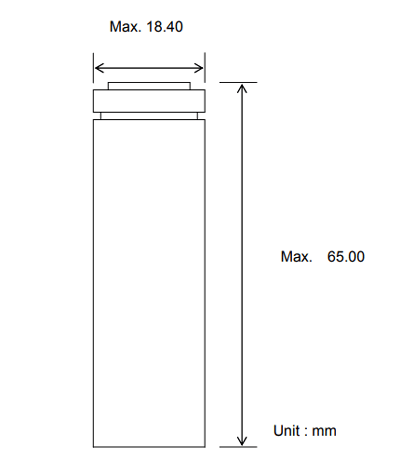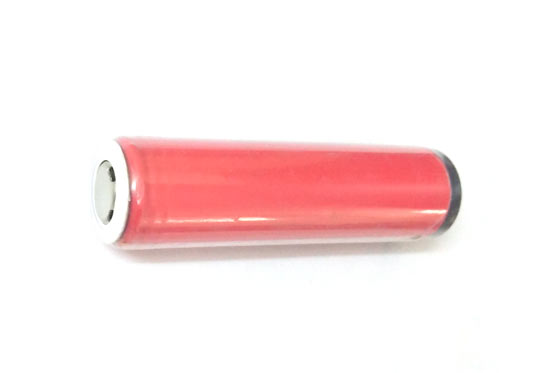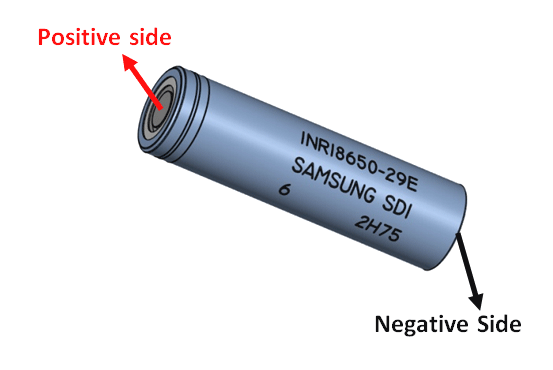18650 Lithium Ion Battery
18650 Cell Features and Technical Specifications
- Nominal Voltage: 3.6V
- Nominal Capacity: 2,850 mAh
- Minimum Discharge Voltage: 3V
- Maximum Discharge current: 1C
- Charging Voltage: 4.2V (maximum)
- Charging current: 0.5C
- Charging Time: 3 hours (approx)
- Charging Method: CC and CV
- Cell Weight: 48g (approx)
- Cell Dimension: 18.4mm (dia) and 65mm (height)
Where to use an 18650 Li-ion Cell
The 18650 Cell is a Li-ion type battery which has found its application in many fields such as Portable electronics like torch lights, Electric Vehicles/Cars like Tesla and much more. The main reason for this battery being successful is its properties compared to its competitors. These properties include current carrying capability, voltage, cycle life, storage life, safety, and operating temperature and much more. Below table shows the comparison between popular batteries for key parameters.
Lead Acid vs Ni-Cd vs Ni-MH vs Alkaline vs Li-ion vs Li-Polymer Batteries
|
Parameter |
Lead Acid |
Ni-Cd |
Ni-MH |
Alkaline |
Li-Ion |
Li-Polymer |
|
Cell Voltage |
2V |
1.2V |
1.2V |
1.5V |
3.6V |
3.7V |
|
Cost |
Low |
Moderate |
High |
Very Low |
Very High |
Very High |
|
Internal Resistance (IR) |
Low |
Very Low |
Moderate |
Varies |
High |
Low |
|
Self Discharge (%/month) |
2% to 4% |
15% to 30% |
18% to 20% |
0.3% |
6% to 10% |
5% |
|
Charge Cycle |
500 to 2000 |
500 to 1000 |
500 to 800 |
Low |
1000 to 1200 |
>1000 |
|
Overcharge Tolerance |
High |
Medium |
Low |
Medium |
Very Low |
Very Low |
|
Energy Density (Wh/kg) |
30 to 45 |
45 to 50 |
55 to 65 |
80 |
90 to 110 |
130 to 200 |
|
Memory Effect |
No |
Yes |
Yes |
Yes |
No |
No |
|
Maintenance |
Very High |
High |
Low |
Low |
Low |
Low |
|
Safety |
Highly Safe |
Safe |
Safe |
Safe |
Un-Safe |
Un-Safe |
What is C rating and mAh of a battery?
While working with batteries, the two most common terms you will come across is the mAh rating and the C rating. An 18650 cell rated at 2850mAh means that when we consume 2.850A from the battery it will last for 1 hour and similarly if we consume only 0.285A from the battery it will last for 10 hours so we can use the Ah rating to calculate how long your battery will last for your application based on the current consumed.
C rating for a 18650 battery is usually 1C, this means that we can consume a maximum of 2.85A from the battery. This is because (Ah rating * C rating) gives us the maximum current that can be sucked out from the battery. For instance if the C rating for our battery had been 0.5C then we should only consume a maximum of 1.42A (2.8/2) from the battery.
How to use an 18650 Cell
The 18650 Cell belongs to the Lithium Ion type chemistry and hence very high care has to be taken while using it. This includes while both charging and discharging the batteries. While discharging the battery, care should be taken that we never consume more current the C rating and also the battery should never be discharged below 3.0V. Normally a circuit will be employed to monitor the discharge current and under voltage value to cut off the battery from the load if anything goes wrong. Also care should be taken that the battery never experiences a short circuit or reverse polarity. If you are using a single 18650 cell then a battery protection module like TP4056 is highly recommended to charge and discharge these module safely.
How to charge an 18650 Cell
The charging voltage of 18650 cell is 4.2V and recommended charging current is 1A (0.5C). Again a module like TP4056 will come in very handy to charge this module and will also provide protection while discharging.
Normally to achieve higher level of voltages more than one 18650 cells will be connected in series or parallel in that case care should be taken that all the cells are maintained in the same voltage levels, this process is called as cell balancing and is usually done using a BMS (Battery management system) which takes the responsibility of charging and discharging the batteries uniformly.
Applications
- Portable Electronics
- Electric Vehicles
- Solar powered devices
- Power walls
- Power banks
- Laptop Batteries
2D-Model








котел для варки сиропа